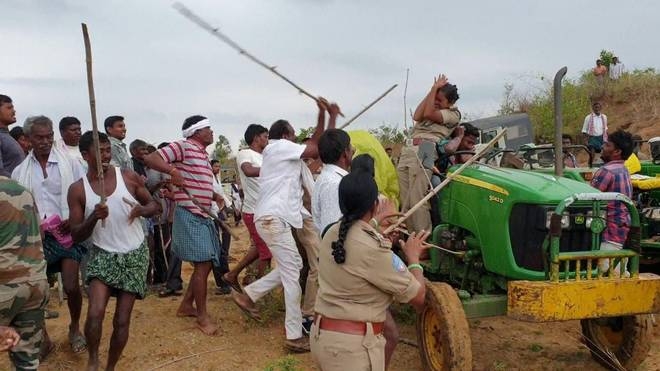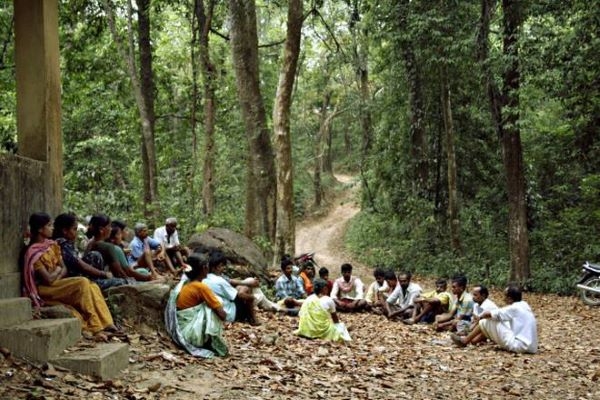Unrest is genuine, but manifestation is ugly! Another forest official assaulted in Telangana by forest dwellers
Total Views |
New Delhi, October 30: ‘Who is the real owner of forests?’ has been a burning question in India. When local people residing in or near the forests make any activity like cultivation, grazing or collecting firewood for their livelihood; it is considered as ‘encroachment’ as the land is owned by the Forest Department. This gives birth to constant conflicts between forest dwellers and forest officials. In Telangana, yet another incident happened yesterday where a lady forest officer named Swapna was assaulted by locals when she was uprooting mango plants grown by Lambada farmers.

Farmers allegedly pelted stones and sprinkled red chilli powder at the forest officials who visited their field to uproot the plants. The forest officer claimed that it was government land which was 'encroached' and said that she was undertaking an afforestation drive as per the orders she received, while the Lambada farmers said that they had been cultivating the area near Kothapalli village in Mancherial district for decades.
This is second such incident where a forest officer has been attacked. Earlier, C Anitha was severely injured after a group of locals attacked her for carrying out a similar 'anti-encroachment' drive. Several forest officials in the area that came under erstwhile Adilabad district and Bhadradri Kothagudem district, have been faced with hostile farmers from traditional forest-dwelling communities due to a government sponsored afforestation drive. As part of the drive, the government has been identifying land and is taking up plantation drives. However, locals in the forests say that this goes against their interests, as they survive on ‘Podu’, a traditional farming practice of forest dwellers, which involves shifting cultivation.
Podu is a form of farming that involves in shifting cultivation methods. This is traditionally practiced on the hill-slopes, mainly by central India tribes. While forest officials allege that farmers are illegally cultivating the lands, the locals claim that they're traditional forest dwellers and have rights over forest lands.

What exactly causes such conflicts? Have a brief look on its background:
The answer can be given in three simple words – Forest Rights Act. In the pre-British era, India had a large population of forest dwellers, living in harmony with nature. No supreme body existed which would prevent them from using forest resources for livelihood needs. Adivasis also had great compassion towards nature and had developed many traditions of its conservation.
It was the year 1864 when the British established the Forest Department and right in the next year, in 1865, the British passed the Indian Forest Act and established ownership rights over the entire forest land in India. The purpose was simple – Britishers needed wood for their industries which was abundantly available in Indian forests. By this act, the traditional rights of local people over forest resources were seized. This was the triggering point of the conflicts between locals and the government, which went on intensifying further, even after India’s independence.
The Forest Act of 1865 amended twice in 1878 and 1927 aimed at declaring the forests of India the property of the government ergo a resource of the British Crown. The Criminal Tribes Act of 1871 was a heinous law with which many tribes were declared ‘criminal’! Criminal for making cultivation and collecting firewood!

The situation didn’t improve much after independence as the government didn’t show any interest in amending the act and giving the rights of forest resources back to the local people. In 1988, National Forest Policy was formed which assured that the biomass needs of ecosystem people must have primacy over the commercial demands. In 2006, the Centre passed the ‘Scheduled Tribes and Other Traditional Forest Dwellers (Recognition of Forest Rights) Act’, which protects the interests of tribal groups.
The Forests Rights Act enables a nuclear tribal family to claim up to 4 acres of land along with recognising diverse pre-existing rights over forest land. These include rights over occupied forest land and Minor Forest Products and customary rights of tribals. The Centre is now planning to bring in amendments to the law, which is being criticised by forest dwellers and activists, who say that the proposed amendments will strip forest dwellers of their rights.
The conflict in Kagaznagar is just another facet of the larger battle that forest dwellers in India are currently fighting to safeguard their rights. The issue is too complicated to resolve but now it’s a high time to take some concrete action, otherwise such ugly manifestations will take no time to turn into deadly fire.
